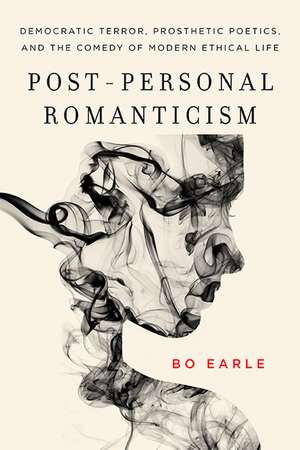Post-Personal Romanticism: Democratic Terror, Prosthetic Poetics, and the Comedy of Modern Ethical Life
Autor Bo Earleen Limba Engleză Paperback – 29 sep 2021
Post-Personal Romanticism: Democratic Terror, Prosthetic Poetics, and the Comedy of Modern Ethical Life by Bo Earle offers a broad recasting of Romantic lyric’s formal innovations in terms of Hegel’s historical ethics. These innovations attempt to come to terms with the Enlightenment’s paradoxical legacy: industrial and consumerist modernity depends on the Enlightenment norm of rationally autonomous individuality even as it makes this norm ever more implausible. In turn, a key insight of the Romantics is that modernity depends most crucially upon the very elusiveness of this norm of autonomous individuality. The Romantics emphasize that modernity is constitutively a culture of fantasy, a culture self-conscious about the impossibility of its own organizing values and goals.
Tracing this insight to Hegel’s suggestion that modern subjectivity is in some sense post-individual or even posthumous, Earle argues that signature Romantic lyrics offer a way forward that avoids postmodernism’s wholesale rejection of autonomous selfhood. With chapters on Wordsworth, Blake, Byron, Shelley, and Keats, Earle traces how Romantic lyrics mine this interminability to recover figurative emblems or masks of selfhood from experiences of its inevitable normative failure. This model is of particularly urgent value today when the costs of modern narcissism, economic exploitation, and political imperialism have come to include the normalization of torture, signature drone strikes, and climate change.
Tracing this insight to Hegel’s suggestion that modern subjectivity is in some sense post-individual or even posthumous, Earle argues that signature Romantic lyrics offer a way forward that avoids postmodernism’s wholesale rejection of autonomous selfhood. With chapters on Wordsworth, Blake, Byron, Shelley, and Keats, Earle traces how Romantic lyrics mine this interminability to recover figurative emblems or masks of selfhood from experiences of its inevitable normative failure. This model is of particularly urgent value today when the costs of modern narcissism, economic exploitation, and political imperialism have come to include the normalization of torture, signature drone strikes, and climate change.
Preț: 272.32 lei
Nou
Puncte Express: 408
Preț estimativ în valută:
52.11€ • 54.10$ • 43.45£
52.11€ • 54.10$ • 43.45£
Carte tipărită la comandă
Livrare economică 24 martie-07 aprilie
Preluare comenzi: 021 569.72.76
Specificații
ISBN-13: 9780814254448
ISBN-10: 0814254446
Pagini: 244
Dimensiuni: 152 x 229 x 20 mm
Greutate: 0.34 kg
Ediția:1
Editura: Ohio State University Press
Colecția Ohio State University Press
ISBN-10: 0814254446
Pagini: 244
Dimensiuni: 152 x 229 x 20 mm
Greutate: 0.34 kg
Ediția:1
Editura: Ohio State University Press
Colecția Ohio State University Press
Recenzii
“Post-Personal Romanticism is compulsively readable. It is a bracing book that manages to both redirect, and return to, key questions of Romanticist criticism. Earle reads Romanticism not through the lens of a narrow historicism but as an exemplary, if also reflexive, symptom of a post-revolution, post-terror modernity that finds its utopian vistas unrealizable.” —Tobias Menely, author of The Animal Claim: Sensibility and the Creaturely Voice
“For teachers of Romantic-era literature, Earle supplies brilliant new ways to frame its relevance to contemporary life—a project that feels more urgent than ever in the university classroom.” —Review 19
Notă biografică
Bo Earle is Assistant Professor of English at the University of British Columbia.
Descriere
Hegel’s suggests, in the Phenomenology’s account of the interdependency of freedom and terror, that modern subjectivity is in some sense post-individual or even posthumous. Instead of postmodernism’s overhasty pretense altogether to dispense with the norm of autonomous selfhood, Post-Personal Romanticism by Bo Earle explores how signature Romantic lyrics mine this interminability to recover figurative emblems or masks of selfhood from experiences of its inevitable normative failure.
